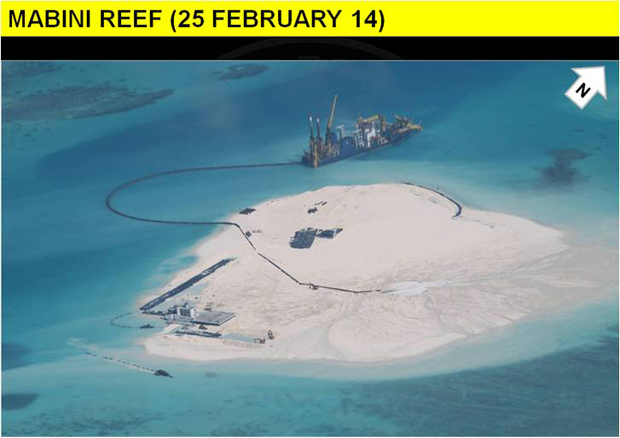PH racing against China’s reclamation in West PH Sea

The DFA released photos of the Mabini Reef showing China’s reclamation activities on the disputed area. DFA
MANILA, Philippines–The Philippines is racing against China’s reclamation activities in the South China Sea as it seeks a consensus among member states of the Association of Southeast Asian Nations (Asean) regarding the maritime disputes in the region.
Department of Foreign Affairs (DFA) Secretary Albert del Rosario said in a televised interview earlier Monday that he was seeking the help of the Asean in freezing all activities in the South China Sea in order to de-escalate tensions.
“It’s not a new proposal, we are trying to reinvigorate the efforts of the Asean to achieve full and effective implementation of the Declaration of Conduct (DOC) of Parties in the South China Sea,” DFA spokesman Charles Jose said in a press conference.
“We want to be a leader in speeding things up. We really need to step on the gas pedal to move faster,” he said.
The DOC is an agreement signed by all 10 members of the ASEAN and China in 2002 which provides that all signatories should “exercise self-restraint in the conduct of activities that would complicate or escalate disputes and affect peace and stability including, among others.”
Article continues after this advertisementIt also states that parties will not conduct activities on the uninhabited islands, reefs, shoals, cays, and other features in the South China Sea.
Article continues after this advertisementRecently, the Philippines has seen reclamation activities of China in several reefs including Mabini Reef, Calderon Reef, Gaven Reef, and McKennan Reef.
Jose said in previous briefings that the reclamation activities were being done to “jeopardize” the Philippines’ case before the International Tribunal on the Law of the Sea (Itlos) because they were altering the said features.
“There is really a need to de-escalate and for everyone to desist from undertaking activities that raise tensions and activities that could be viewed as provocative,” Jose said.
“We consider the actions they are doing, and reclamation work that they are doing, as actions that raise tensions in the area and actions that are in violation of the DOC,” he said.
Under the United Nations Convention on the Law of the Sea (Unclos) which mandates how much maritime territory a country has, natural islands are entitled to a 200 nautical-mile exclusive economic zone (EEZ) and a 12-nautical mile territorial sea.
Submerged maritime features such as reefs and rocks are not entitled to any maritime territory. The Unclos, however, does not state rules for artificial islands.
RELATED STORIES
PH mulls asking Asean to stop all activities in disputed waters
China’s land reclamation ‘jeopardizes’ PH case in UN, says DFA
For comprehensive coverage, in-depth analysis, visit our special page for West Philippine Sea updates. Stay informed with articles, videos, and expert opinions.